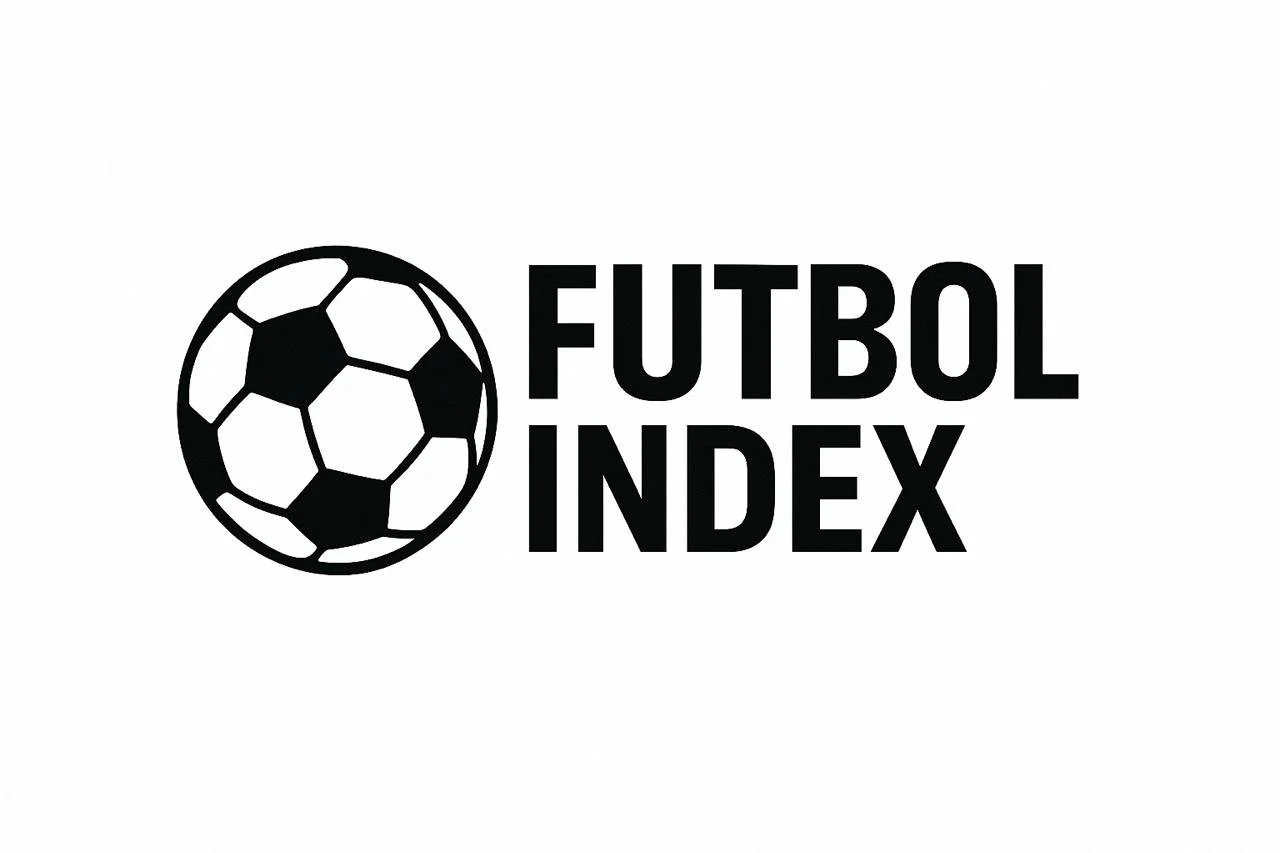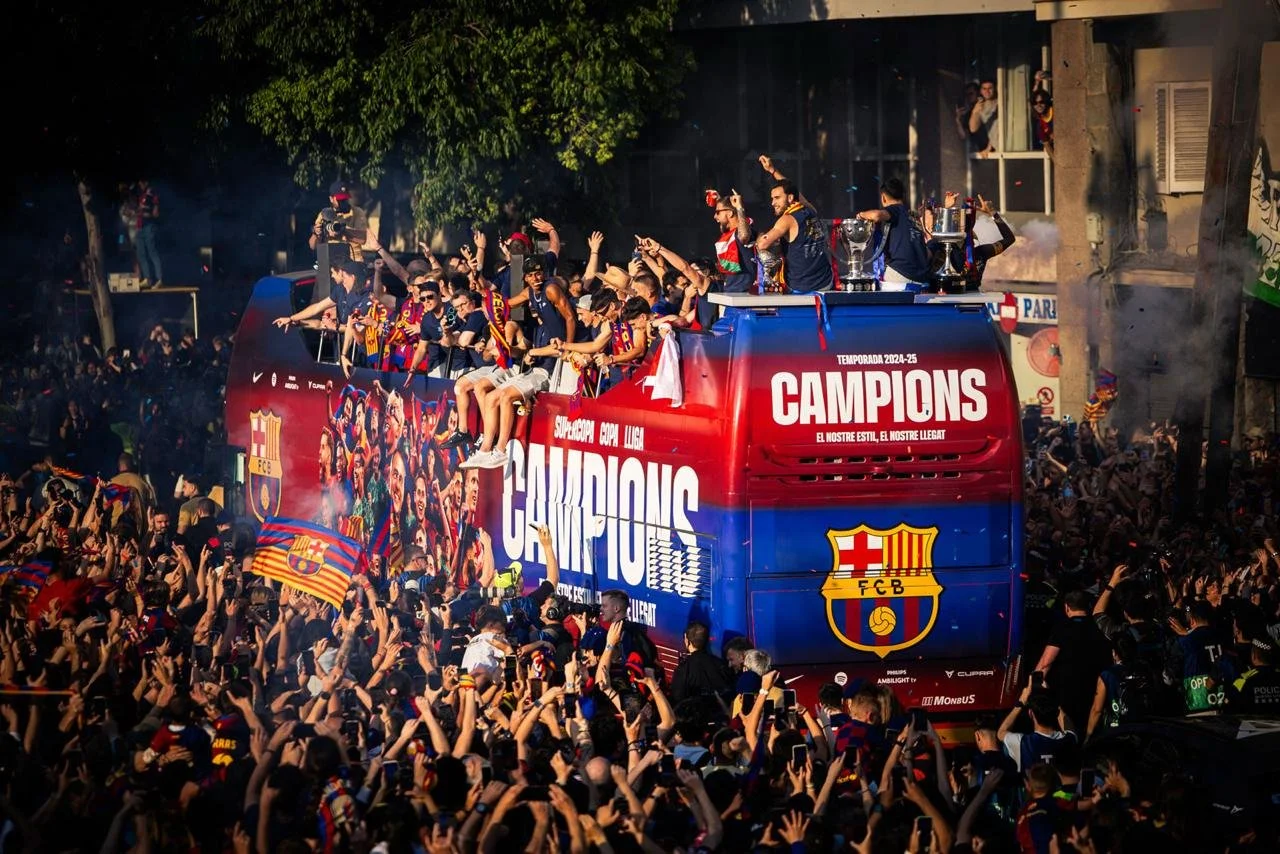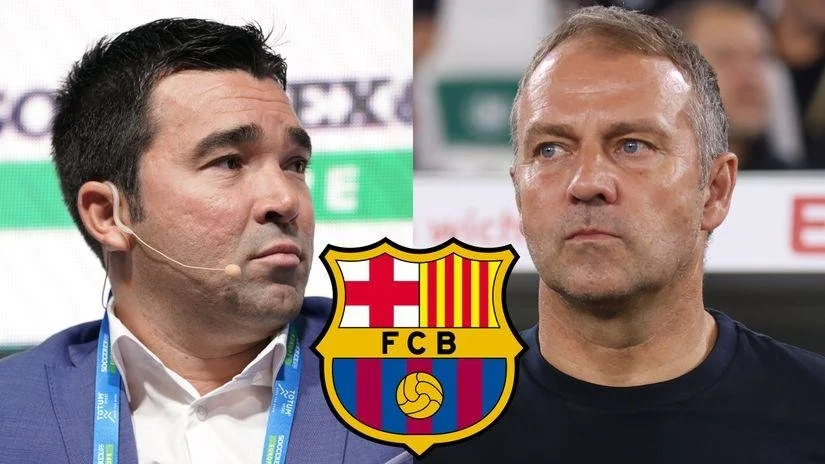25/26 Transfer Review: FC Barcelona
Barcelona’s Double Life: Flick’s Ferrari on the Pitch, Deco’s Dilemma off-field
Success on the Pitch, Chaos off It
FC Barcelona and its fanbase experienced a highly successful last season. The club had brought the German wizard Hansi Flick, who instantly delivered success and joy to its fans. The Blaugrana went on to clinch a domestic treble and a dream Champions League run after years of heartbreak and disappointment. Flick’s attacking brilliance, tactical flexibility, and trust in young players created a side that looked like Barcelona of old—dominant, fearless, and joyous to watch.
But as the saying goes, “Every cloud has a silver lining.” For Barcelona, that lining was not golden—it was a reminder of the club’s frailties off the pitch. Beneath the silverware and champagne celebrations lay a story of inefficiency, bureaucratic battles, and financial handcuffs. The shadow of La Liga’s Financial Fair Play (FFP) restrictions loomed large, and instead of celebrating stability, Barça fans were forced to relive the déjà vu of courtroom battles and deregistration’s.
Last season symbolized the contrast: smooth, champagne football on the field but turbulence off it. While Dani Olmo’s signing from RB Leipzig initially felt like a straightforward coup, the real drama unfolded at the registration desk. Because of Andreas Christensen’s injury, Barcelona could temporarily register Olmo, but only for half a season. The board promised to resolve the FFP issue by January 2025, yet when the deadline came, they failed spectacularly. La Liga promptly deregistered Olmo, sparking a messy legal spat between the league and its most storied club.
The irony was painful—Barcelona, a global giant, lifting trophies like a Ferrari on grass, yet stalling in the garage because the front office couldn’t navigate financial rules.
A New Era Under Deco—or a Step Backward?
When Joan Laporta returned as president, he relied heavily on Mateu Alemany as sporting director. Alemany, despite financial chaos, pulled off remarkable deals—Robert Lewandowski, Jules Koundé, and more. He was a master at creative negotiations, striking a balance between Barça’s ambitions and their grim bank statements.
But after his departure, in came Deco—a beloved former player but a novice in high-level sporting administration. Since his arrival, Barcelona’s transfer operations have looked chaotic and directionless. Every signing turned into a saga, every outgoing dragged on, and the club’s long-term strategy seemed to blur.
The Olmo fiasco perfectly reflects this. If Deco and the board knew the financial situation, why chase a deal they couldn’t sustain? If desperate, why not plan an exit strategy in parallel? The lack of foresight fuelled questions about Deco’s suitability for the role.
Optimists argued it was a one-off mistake. But when similar sagas unfolded again this summer, the doubts grew louder: is Deco truly the right man to guide Barça through this delicate phase?
Ter Stegen Turmoil: The Captain Who Lost His Place
Marc-André Ter Stegen’s situation epitomizes the tension between sporting decisions and administrative mismanagement.
At the end of last season, it was evident that Barça’s first-team captain was no longer Flick’s preferred choice. The German coach trusted Wojciech Szczęsny, leaving Ter Stegen’s future uncertain. Reports suggested Ter Stegen had no intention of leaving unless heavily compensated.
Then came the twist: Ter Stegen announced he would undergo surgery, side-lining him for months. The club, desperate to free salary space, tried to use his absence to their advantage under La Liga’s rules. But Stegen publicly contradicted their narrative, declaring his recovery would take only three months. Worse, he did so without consulting club doctors—sparking a major fallout.
The board’s response was drastic: they stripped him of the captaincy. But then a compromise was reached, and he eventually regained it.
The drama wasn’t just about egos. It directly affected Barça’s registration battle. Szczęsny and new signing Joan Garcia had to race against time to be registered. Once again, Barça’s financial juggling act left key players in limbo just before the season kicked off.
Transfers: Bargains, Blunders, and Missed Opportunities
Barcelona has never been a selling club in the way the Premier League giants are. But under Deco, their inability to offload players has reached crisis levels.
Consider Clément Lenglet. After an impressive loan at Atlético Madrid, he should have commanded a transfer fee. Instead, Barcelona terminated his contract, allowing him to join Atlético for free. In one stroke, Barça strengthened a direct rival without financial compensation.
Youngster Pablo Torre, one of Spain’s U21 standouts, was sold for just €6 million upfront. Pau Víctor, another promising talent, left for €12 million. In total, the Blaugrana raised just €23 million—an amount dwarfed by what mid-table Premier League clubs receive for squad players.
Incoming transfers, meanwhile, reflected both ambition and desperation. Joan Garcia, Espanyol’s highly rated goalkeeper, cost €25 million. Marcus Rashford arrived on loan from Manchester United, a blockbuster deal in name but one with significant salary implications. Roony Bardghji, the Swedish wonderkid, also joined to provide depth on the wings.
On paper, Barcelona spent €27.5 million while earning €23 million—a net spend of just €4.5 million. But the story wasn’t in the numbers. It was in the imbalance: strengthening attack while weakening defense, adding salaries while still shackled by FFP, and failing to maximize sales.
Registrations! Ahh, Here We Go Again!
Barcelona supporters felt the déjà vu again in this transfer window. Again, owing to their financial restructuring coupled with the infamous La Liga “FFP Rules,” they struggled with registering their signings. With the new Spotify Camp Nou not yet operational and the much-talked-about VIP seats deal in ratification, Barca had relied upon reduction of wage bill and outgoing to make room in their FFP limits for registration. It started with Lenglet leaving for free, followed by Fati on loan. Then came one plot twist with the arrival of Rashford on a 14 million net salary; it was evident somebody had to leave. Initially it looked like it would be the German keeper, but as discussed above, he ended up staying.
Then came perhaps the shock of the season for Barcelona supporters. Well-known journalist Fabrizio Romano, in his famous style, said, "Here We Go." “Inigo Martinez to Al Nassr."
The Spanish defender who was referred to as instrumental in ‘Barcelona’s high-line defensive approach’ has left the club for Saudi Arabia. One question that came to everyone’s mind was “What just happened? and why?”
In order to register Rashford with his net annual salary for the year, the club decided to let go of one of their best defender from last season. Inigo Martinez's net salary of 14 million a year is exactly what Rashford was about to get. So on record it was a straight swap deal for the Catalans: Inigo “OUT” and Rashford “IN.”
With this swap, what was its impact on the field? Yes, in attack another exciting option was added, but in defense it had lost the orchestrator of the famous offside trap, which was highly successful last season. Also, Inigo was their only left-footed center back in the squad, which meant someone will have to play out of position in that defense.
The impact of Inigo leaving is evident in the first three matchdays of the season. Defense, which looked solid and confident throughout the last campaign, was shaky and nervy, resulting in Hansi Flick experimenting in order to get his backline solidified for the season. This experimentation and nerves resulted in Catalans leaking goals and even dropping crucial points at the start of the new campaign.
Even after the departure of Inigo, the registration issue remained unsolved, as till the final few hours before the window shut, Catalans somehow managed to register Wojciech Szczęsny and Gerard Martin owing to the departure of Hector Fort and Pablo Torre for cheap.
Their newest arrival, Roony, eventually had to be registered with a second team license but will be allowed to play for the first team.
Lessons from Rivals: What Barça Can Learn
Barcelona’s struggles are not unique—clubs like Inter Milan, Juventus, and even PSG have danced around FFP rules. The difference is in execution. Inter, for instance, sold Onana and Brozović for healthy fees while still competing for trophies. PSG routinely balances superstar arrivals with high-profile exits.
Barça, however, consistently weakens themselves: losing assets for free, selling cheap, and replacing them with risky short-term loans. The lack of coherent planning is glaring compared to their European rivals.
Conclusion: Double Life Exposed—Ferrari Racing, Engine Stalling
Barcelona remain a Ferrari on the field under Flick, dazzling fans with their performances. But off it, under Deco’s watch, the club looks sluggish, disorganized, and reactive. The Catalans cannot afford more courtroom battles, deregistration, or financial missteps.
For Deco, the challenge is monumental. He must blend his football knowledge with sharper planning, financial discipline, and long-term vision. The stakes are enormous: Barça’s golden generation of youth—Yamal, Gavi, and Balde—cannot be wasted by bureaucratic mismanagement.
The question remains: Can Deco shift gears fast enough, or will Barcelona’s off-field chaos continue to stall their long-term vision? For now, Flick’s Ferrari races forward, but without a steady pit crew, the ride could end in a crash.



